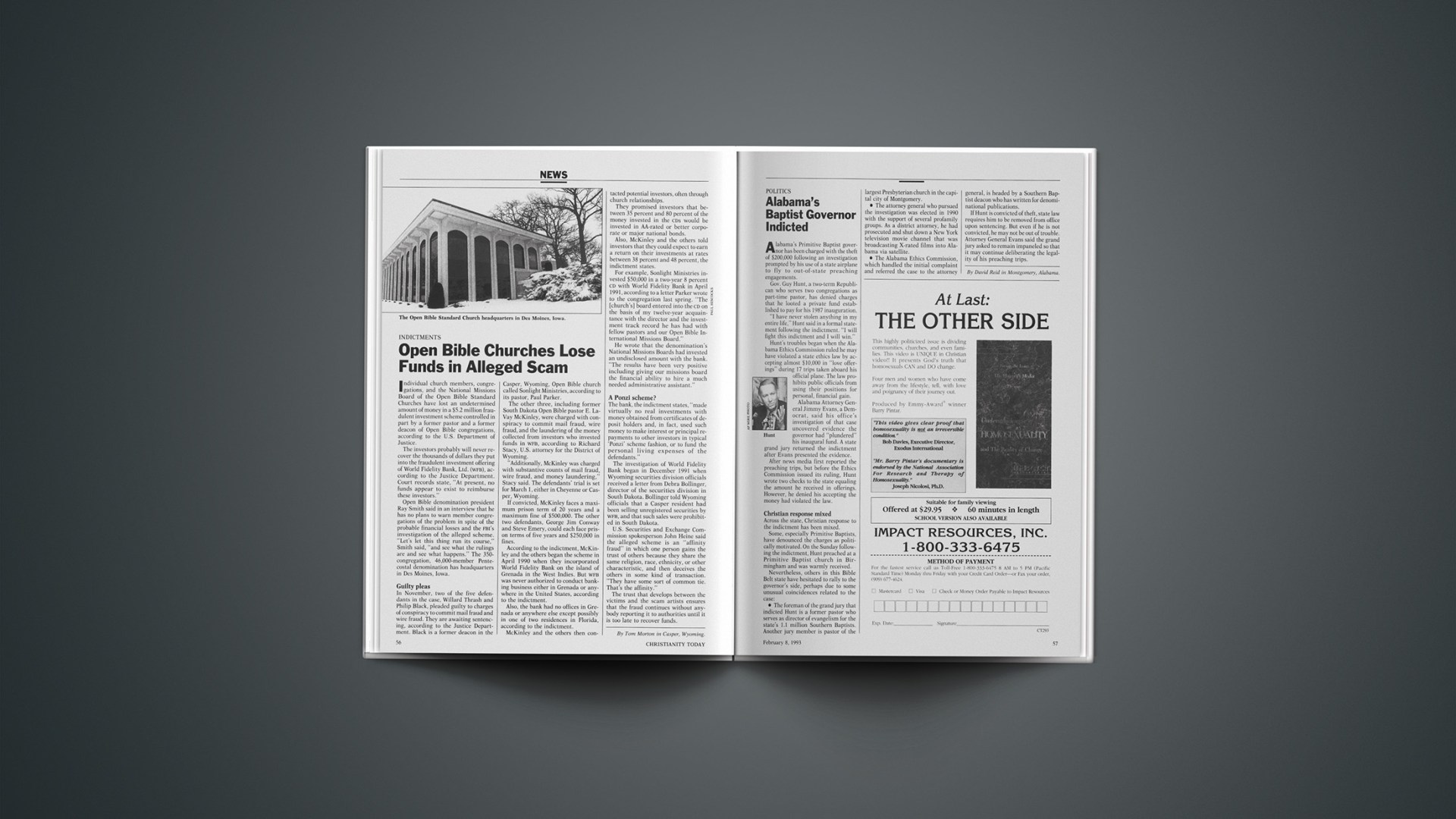Individual church members, congregations, and the National Missions Board of the Open Bible Standard Churches have lost an undetermined amount of money in a $5.2 million fraudulent investment scheme controlled in part by a former pastor and a former deacon of Open Bible congregations, according to the U.S. Department of Justice.
The investors probably will never recover the thousands of dollars they put into the fraudulent investment offering of World Fidelity Bank, Ltd. (WFB), according to the Justice Department. Court records state, “At present, no funds appear to exist to reimburse these investors.”
Open Bible denomination president Ray Smith said in an interview that he has no plans to warn member congregations of the problem in spite of the probable financial losses and the FBI’s investigation of the alleged scheme. “Let’s let this thing run its course,” Smith said, “and see what the rulings are and see what happens.” The 350-congregation, 46,000-member Pentecostal denomination has headquarters in Des Moines, Iowa.
Guilty pleas
In November, two of the five defendants in the case, Willard Thrash and Philip Black, pleaded guilty to charges of conspiracy to commit mail fraud and wire fraud. They are awaiting sentencing, according to the Justice Department. Black is a former deacon in the Casper, Wyoming, Open Bible church called Sonlight Ministries, according to its pastor, Paul Parker.
The other three, including former South Dakota Open Bible pastor E. LaVay McKinley, were charged with conspiracy to commit mail fraud, wire fraud, and the laundering of the money collected from investors who invested funds in WFB, according to Richard Stacy, U.S. attorney for the District of Wyoming.
“Additionally, McKinley was charged with substantive counts of mail fraud, wire fraud, and money laundering,” Stacy said. The defendants’ trial is set for March 1, either in Cheyenne or Casper, Wyoming.
If convicted, McKinley faces a maximum prison term of 20 years and a maximum fine of $500,000. The other two defendants, George Jim Conway and Steve Emery, could each face prison terms of five years and $250,000 in fines.
According to the indictment, McKinley and the others began the scheme in April 1990 when they incorporated World Fidelity Bank on the island of Grenada in the West Indies. But WFB was never authorized to conduct banking business either in Grenada or anywhere in the United States, according to the indictment.
Also, the bank had no offices in Grenada or anywhere else except possibly in one of two residences in Florida, according to the indictment.
McKinley and the others then contacted potential investors, often through church relationships.
They promised investors that between 35 percent and 80 percent of the money invested in the CDs would be invested in AA-rated or better corporate or major national bonds.
Also, McKinley and the others told investors that they could expect to earn a return on their investments at rates between 38 percent and 48 percent, the indictment states.
For example, Sonlight Ministries invested $50,000 in a two-year 8 percent CD with World Fidelity Bank in April 1991, according to a letter Parker wrote to the congregation last spring. “The [church’s] board entered into the CD on the basis of my twelve-year acquaintance with the director and the investment track record he has had with fellow pastors and our Open Bible International Missions Board.”
He wrote that the denomination’s National Missions Boards had invested an undisclosed amount with the bank. “The results have been very positive including giving our missions board the financial ability to hire a much needed administrative assistant.”
A Ponzi scheme?
The bank, the indictment states, “made virtually no real investments with money obtained from certificates of deposit holders and, in fact, used such money to make interest or principal repayments to other investors in typical ‘Ponzi’ scheme fashion, or to fund the personal living expenses of the defendants.”
The investigation of World Fidelity Bank began in December 1991 when Wyoming securities division officials received a letter from Debra Bollinger, director of the securities division in South Dakota. Bollinger told Wyoming officials that a Casper resident had been selling unregistered securities by WFB, and that such sales were prohibited in South Dakota.
U.S. Securities and Exchange Commission spokesperson John Heine said the alleged scheme is an “affinity fraud” in which one person gains the trust of others because they share the same religion, race, ethnicity, or other characteristic, and then deceives the others in some kind of transaction. “They have some sort of common tie. That’s the affinity.”
The trust that develops between the victims and the scam artists ensures that the fraud continues without anybody reporting it to authorities until it is too late to recover funds.
By Tom Morton in Casper, Wyoming.










